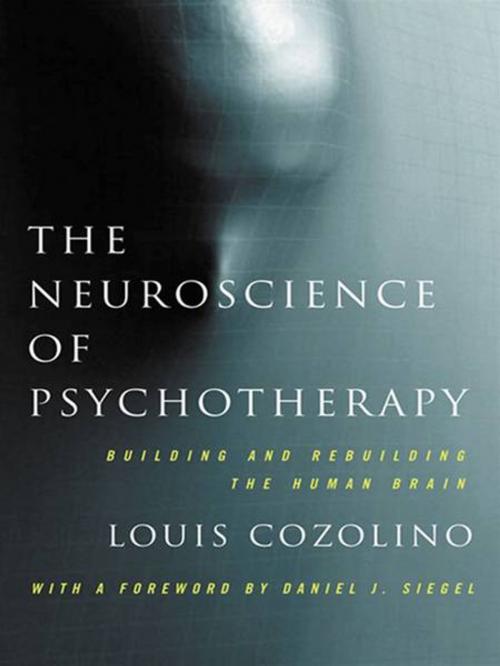The Neuroscience of Psychotherapy: Healing the Social Brain (Second Edition) (Norton Series on Interpersonal Neurobiology)
Nonfiction, Health & Well Being, Psychology, Neuropsychology| Author: | Louis Cozolino | ISBN: | 9780393706574 |
| Publisher: | W. W. Norton & Company | Publication: | June 21, 2010 |
| Imprint: | W. W. Norton & Company | Language: | English |
| Author: | Louis Cozolino |
| ISBN: | 9780393706574 |
| Publisher: | W. W. Norton & Company |
| Publication: | June 21, 2010 |
| Imprint: | W. W. Norton & Company |
| Language: | English |
For years, the brain has been viewed as a relatively static entity, determined by the interaction of genetic preprogramming and early childhood experience.
In contrast to this view, recent theoretical advances in brain imaging have revealed that the brain is an organ continually built and re-built by one's experience. We are now beginning to learn that many forms of psychotherapy, developed in the absence of any scientific understanding of the brain, are supported by neuroscientific findings. In fact, it could be argued that to be an effective psychotherapist these days it is essential to have some basic understanding of neuroscience. Louis Cozolino's The Neuroscience of Psychotherapy is the perfect place to start.
In a beautifully written and accessible synthesis, Cozolino illustrates how the brain's architecture is related to the problems, passions, and aspirations of human beings. As the book so elegantly argues, all forms of psychotherapy--from psychoanalysis to behavioral interventions--are successful to the extent to which they enhance change in relevant neural circuits.
Beginning with an overview of the intersecting fields of neuroscience and psychotherapy, this book delves into the brain's inner workings, from basic neuronal building blocks to complex systems of memory, language, and the organization of experience. It continues by explaining the development and organization of the healthy brain and the unhealthy brain. Common problems such as anxiety, trauma, and codependency are discussed from a scientific and clinical perspective. Throughout the book, the science behind the brain's working is applied to day-to-day experience and clinical practice.
Written for psychotherapists and others interested in the relationship between brain and behavior, this book encourages us to consider the brain when attempting to understand human development, mental illness, and psychological health. Fully and thoroughly updated with the many neuroscientific developments that have happened in the eight years since the publication of the first edition, this revision to the bestselling book belongs on the shelf of all practitioners.
For years, the brain has been viewed as a relatively static entity, determined by the interaction of genetic preprogramming and early childhood experience.
In contrast to this view, recent theoretical advances in brain imaging have revealed that the brain is an organ continually built and re-built by one's experience. We are now beginning to learn that many forms of psychotherapy, developed in the absence of any scientific understanding of the brain, are supported by neuroscientific findings. In fact, it could be argued that to be an effective psychotherapist these days it is essential to have some basic understanding of neuroscience. Louis Cozolino's The Neuroscience of Psychotherapy is the perfect place to start.
In a beautifully written and accessible synthesis, Cozolino illustrates how the brain's architecture is related to the problems, passions, and aspirations of human beings. As the book so elegantly argues, all forms of psychotherapy--from psychoanalysis to behavioral interventions--are successful to the extent to which they enhance change in relevant neural circuits.
Beginning with an overview of the intersecting fields of neuroscience and psychotherapy, this book delves into the brain's inner workings, from basic neuronal building blocks to complex systems of memory, language, and the organization of experience. It continues by explaining the development and organization of the healthy brain and the unhealthy brain. Common problems such as anxiety, trauma, and codependency are discussed from a scientific and clinical perspective. Throughout the book, the science behind the brain's working is applied to day-to-day experience and clinical practice.
Written for psychotherapists and others interested in the relationship between brain and behavior, this book encourages us to consider the brain when attempting to understand human development, mental illness, and psychological health. Fully and thoroughly updated with the many neuroscientific developments that have happened in the eight years since the publication of the first edition, this revision to the bestselling book belongs on the shelf of all practitioners.















